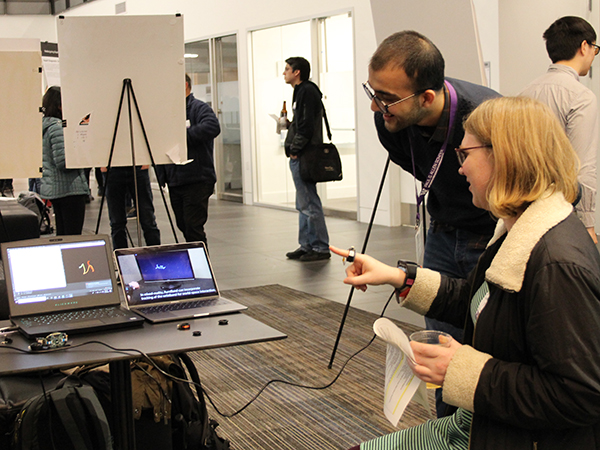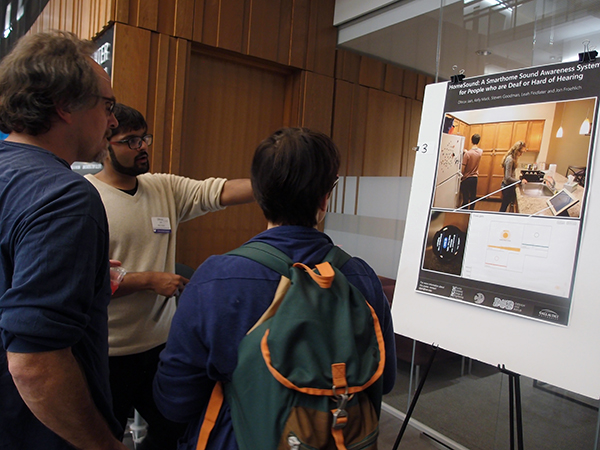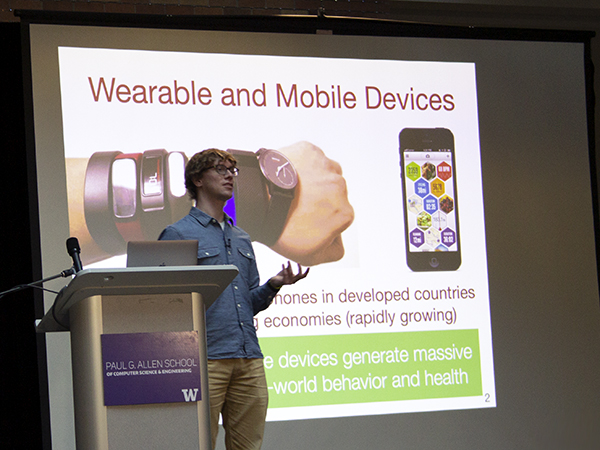
Every fall, the Allen School’s Industry Affiliates program hosts a research showcase to highlight the ways in which our faculty and student researchers are advancing the frontiers of computing. The day-long event features sessions devoted to various topics in computing and culminates in an open house and poster session that gives our industry partners, alumni, and friends an opportunity to learn more about the latest innovations emerging from Allen School labs.
Among the many highlights of the 2019 Research Showcase, which was held Wednesday in the Paul G. Allen Center and Bill & Melinda Gates Center on the University of Washington’s Seattle campus, was a keynote by professor Tim Althoff. Althoff, who joined the Allen School faculty last year, combines techniques from data mining, social network analysis, and natural language processing to generate actionable insights about people’s physical and mental health.
For example, Althoff is pursuing ground-breaking research that aims to use data generated by people’s everyday behavior to better understand the level and variance of physical activity of populations around the world. As part of this work, he found that the inequality of physical activity within a country is a predictor of obesity rates. Althoff believes that such insights can inform how our environment influences our behavior and health, and in the future could support the data-driven design of cities.
“This research is uniquely enabled by the massive digital traces generated by wearables and mobile devices,” explained Althoff. “It revealed the existence of a health inequality that we were previously unaware of.”
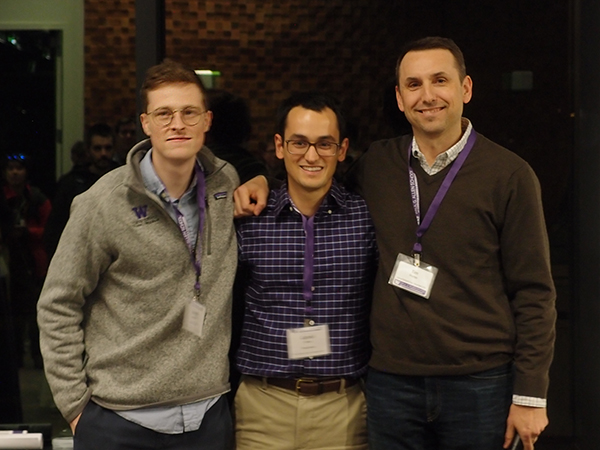
For another project, Althoff analyzes online search engine interactions to gauge the impact of sleep on cognitive performance in the workplace and among athletes. He is also exploring a data-driven approach to mental health counseling to identify the most effective conversational strategies to support peer-to-peer counseling and improve client outcomes.
In addition to Althoff’s talk, the program included in-depth sessions in which participants had an opportunity to explore the latest developments across a variety of domains, including data management, programming languages and software engineering, robotics, systems, augmented and virtual reality, ubiquitous computing, machine learning, deep learning for natural language processing, and the intersection of computation and biology. At the end of the day, Allen School leadership and representatives of Madrona Venture Group announced the recipients of the 14th annual Madrona Prize and the People’s Choice Award — a tradition in which we celebrate the innovative contributions of our student researchers with prizes and public bragging rights.
This year’s grand prize winner, CoAI: Cost-Aware Artificial Intelligence for Health Care from the Allen School’s Laboratory of Artificial Intelligence for Medicine and Science (AIMS) led by Professor Su-In Lee, was chosen by Madrona Venture Group for combining excellence in research with the potential for commercial success. CoAI is a machine learning method for making cost-sensitive predictions in clinical settings that maintains or improves accuracy while dramatically reducing the time it takes to predict a variety of patient outcomes. The team, which includes Lee, Allen School Ph.D./M.D. students Gabriel Erion and Joseph Janizek, and Drs. Carly Hudelson and Nathan White of UW Medicine, developed CoAI to integrate with existing machine learning packages with just a few lines of code to improve patient care when it comes to time-sensitive clinical prediction tasks in all areas of medicine.
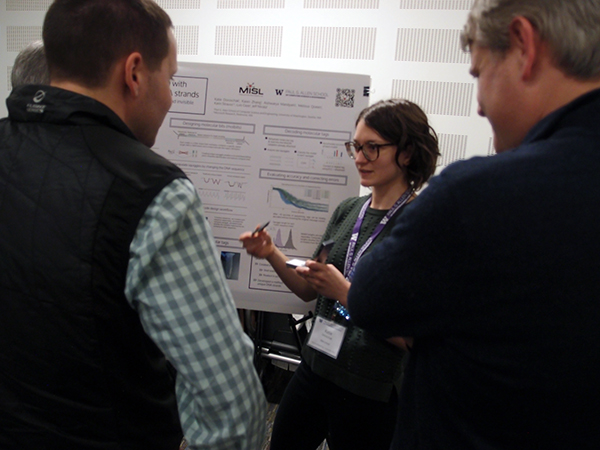
Madrona also recognized three runners-up that also exemplify high-quality research combined with commercial potential:
AuraRing: Precise Electromagnetic Finger Tracking via Smart Ring, from the UbiComp Lab, by Electrical & Computer Engineering Ph.D. students Farshid Salemi Parizi and Alvin Cao; Allen School alumnus Eric Whitmire (Ph.D., ‘19), now a research scientist at Facebook Reality Labs; Allen School Ph.D. student Ishan Chatterjee; GIX master’s student Tianke Li; and professor Shwetak Patel, who holds a joint appointment in the Allen School and Department of Electrical & Computer Engineering
Molecular Tagging with Nanopore-orthogonal DNA Strands, from the Molecular Information Systems Lab, by Allen School Ph.D. students Katie Doroschak and Melissa Queen; Chemistry undergraduate Karen Zhang; Allen School master’s student Aishwarya Mandyam (B.S., ‘19); research scientist Jeff Nivala; Allen School affiliate professor Karin Strauss, Principal Research Manager at Microsoft Research; and Allen School professor Luis Ceze.
HomeSound: Exploring Sound Awareness in the Home for People Who Are Deaf and Hard of Hearing, from the Makeability Lab, by Allen School Ph.D. students Dhruv Jain and Kelly Mack; Human-Centered Design & Engineering Ph.D. student Steven Goodman; professor Leah Findlater of the Department of Human-Centered Design & Engineering; and Allen School professor Jon Froehlich.
Calling the Allen School showcase “one of the highlights of our year,” Madrona managing director Tim Porter said, “The Allen School at the UW is an incredibly important resource for our region and as the school has grown and actively attracted researchers from many different areas, we have seen the breadth and depth of innovation grow.”
HomeSound also took home the coveted People’s Choice Award, which is voted on by attendees at the open house as their favorite poster or demo of the evening. The runner-up for People’s Choice was ALFRED: A Benchmark for Interpreting Grounded Instructions for Everyday Tasks. The team behind ALFRED spans the Allen School’s Robotics and Natural Language Processing groups, including Allen School Ph.D. students Mohit Shridhar and Daniel Gordon; Allen School postdoc Jesse Thomason; former postdoc Yonatan Bisk, currently a visiting researcher at Microsoft; Winson Han and Roozbeh Mottaghi of the Allen Institute for Artificial Intelligence; and Allen School professors Luke Zettlemoyer and Dieter Fox.
“Our students and faculty aim for real-world impact, and it really shows in the presentations we saw this week,” said Hank Levy, director of the Allen School. “We’re pleased that so many of our industry partners could join us to learn about the exciting developments happening in our labs — developments that not only will advance our field, but also have the potential to improve millions of people’s lives. I want to thank Madrona Venture Group, in particular, for their friendship and support to the school and our students throughout the years.”
This is the 14th year in which Madrona has formally recognized student research with commercial potential emerging from the Allen School.
Read more in the Madrona press release here, and check out GeekWire’s coverage of Althoff’s keynote here and the poster session here. See a complete list of past Madrona Prize winners here, and learn more about the Allen School’s Industry Affiliates program here.
Thanks to Madrona and to all of our industry partners, alumni and friends who showed up yesterday in support of our students, and congratulations to the winners — see you next year!


